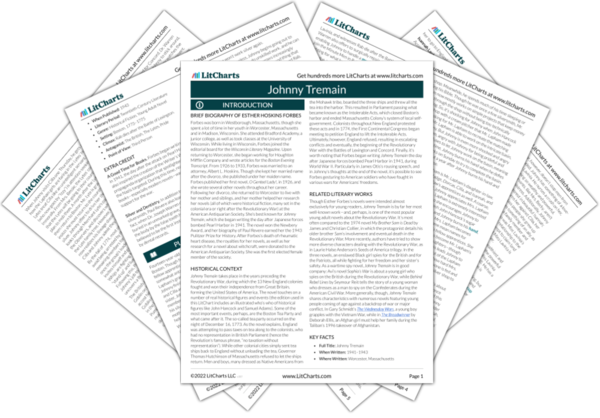Johnny’s hand is a symbol for Johnny himself; the novel uses Johnny’s relationship to his hand to track his coming-of-age journey. At first, Johnny has full use of both hands. He uses them to become the best silversmith apprentice at Mr. Lapham’s shop, and he’s perhaps one of the most promising apprentices in his Boston neighborhood. However, all of Johnny’s hope for a bright future as a silversmith disappears when he burns his right hand on molten silver, rendering it totally unusable. Though Johnny has always been arrogant and self-important, without his hand and his ability to work silver, he becomes even more so: he refuses to accept that he can no longer learn a skilled trade. He also takes to shocking people by revealing his damaged hand to them with a flourish. The way that he uses and weaponizes his hand to disturb people highlights how Johnny sees himself: as someone incapable of being anything but a curiosity, and as someone who can only gain power by frightening others with his disfigured hand.
As Johnny begins working for the Boston Observer and befriends Rab, though, he begins to let go of his previous arrogance—and he stops using his hand to frighten and shock people. This highlights Johnny’s growing maturity, as well as the fact that he’s finding his place in the world. As a prominent Whig spy, Johnny feels useful and appreciated—he doesn’t need to seek attention immaturely by frightening people with his hand. By the end of the novel, Johnny has emotionally transformed into a generous, kind, and caring young man, although his hand keeps him from being able to handle a musket, something that Johnny believes keeps him from truly becoming a man. Thus, it’s significant when Dr. Warren offers to perform a surgery on Johnny’s hand that would enable Johnny to handle a musket. This promise of a working right hand allows Johnny to come of age emotionally and physically.
Johnny’s Burnt Hand Quotes in Johnny Tremain
Chapter 2 Quotes
This was Johnny’s world, but now he walked through it an alien. They knew what had happened. They did not envy Johnny’s idleness. He saw one nudge another. They were whispering about him—daring to pity him. Dicer’s master, the herring-pickler, yelled some kind remark to him, but Johnny did not answer. Seemingly in one month he had become a stranger, an outcast on Hancock’s Wharf. He was maimed and they were whole.
Chapter 3 Quotes
So Johnny ate as little as he could, and did not come home at noon. But someone would usually slip a piece of hard bread, cheese, jerked beef, or salt fish and johnnycake in the pocket of his jacket as it hung on its hook. He knew it was Cilla, but he never spoke to her about it. His unhappiness was so great he felt himself completely cut off from the rest of the world.
Then Johnny began to talk. He told all about the Laphams and how he somehow couldn’t seem even to thank Cilla for the food she usually got to him. How cross and irritable he had become. How rude to people who told him they were sorry for him. And he admitted he had used no sense in looking for a new job. He told about the burn, but with none of the belligerent arrogance with which he had been answering the questions kind people had put to him. As he talked to Rab (for the boy had told him this was his name), for the first time since the accident he felt able to stand aside from his problems—see himself.
Chapter 6 Quotes
‘You don’t want me to look at it?’
As long as it might take to count ten, there was complete silence. Then the boy said, ‘No, sir—thank you.’
‘Was it God’s will it should be so?’ Doctor Warren meant was it crippled from birth. If so, it would be harder for him to help.
‘Yes,’ said Johnny, thinking of how had ruined it upon a Lord’s Day.
‘God’s will be done,’ said the young doctor.
He thought of Doctor Warren. Oh, why had he not let him see his hand? Cilla, waiting and waiting for him at North Square—and then he got there only about when it pleased him. He loved Cilla. She and Rab were the best friends he had ever had. Why was he mean to her? He couldn’t think.
Chapter 12 Quotes
‘Will it be good enough to hold this gun?’
‘I think I can promise you that.’
‘The silver can wait. When can you, Doctor Warren? I’ve got the courage.’
‘I’ll get some of those men in the taproom to hold your arm still while I operate.’
‘No need. I can hold it still myself.’
The Doctor looked at him with compassionate eyes.
‘Yes, I believe you can. You go walk about in the fresh air, while I get my instruments ready.’












